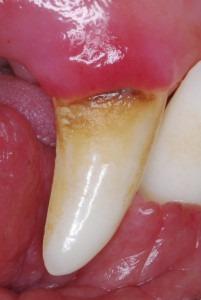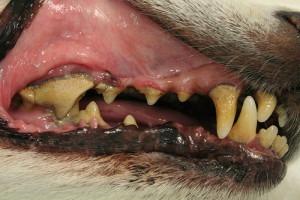Dental problems in pets are often overlooked and can lead to significant health problems. Gum disease is the most common disease in adult dogs.
Gum Disease Progression
The disease begins when bacteria and food material stick to the surface of your pet’s teeth. These bacteria then form an off-white, sticky layer called dental plaque. If the plaque isn’t removed it hardens to form tartar which is a brown, rough deposit on the teeth.

Tartar buildup on teeth
The bacteria within plaque and tartar attack the gums and cause inflammation of the gum tissue, damaging them and then breaking down the attachments to the other structures which hold the teeth in place.

Significant tartar buildup
Untreated, the tooth will become loose and fall out. This is uncomfortable and can be a very painful process for your pet.
Common Causes of Gum Disease
1. Age: Dental disease is more common in older pets.
2. Breed: Smaller dogs are more likely to have overcrowded or misaligned teeth making them difficult to clean, and hence more prone to dental disease.
3. Food: Feeding predominantly wet food tends to lead to a more rapid build-up of plaque and tartar.
Signs of Gum Disease
1. Bad breath: Bad breath in pets is not normal and is almost always a sign of underlying gum disease.
2. Bleeding gums: Bleeding or inflamed gums are a major sign of gum disease.
3. Behaviour: If your pet is less lively, less sociable or less playful it can be because of the effect of gum disease. Your pet may also be reluctant to have their head or face touched which can be a sign of sore teeth or gums. Your pet may also be reluctant to eat hard food or paw at their face.
4. Dribbling: Your pet may dribble or drool more as they have discomfort in their mouth.
Managing Dental Problems
Before beginning any form of home dental care it is important to schedule a dental check up to have your pet’s oral health assessed as they may need a professional descale and polish to clean your pet’s teeth.
Combining a change in nutrition with daily brushing is the most effective way to improve your pet’s dental health. Tooth brushing is the single most effective method to help your pet’s dental health. There are also special foods available which help to remove the soft plaque as the animal bites on the kibbles such as Hill’s Prescription diet t/d.